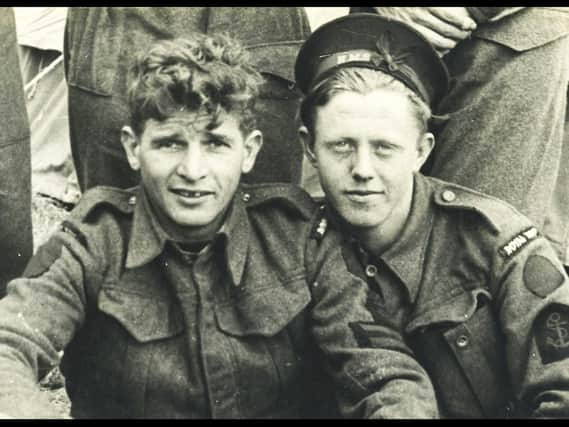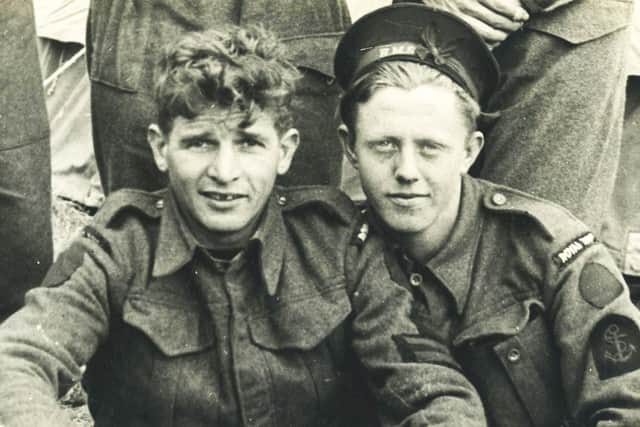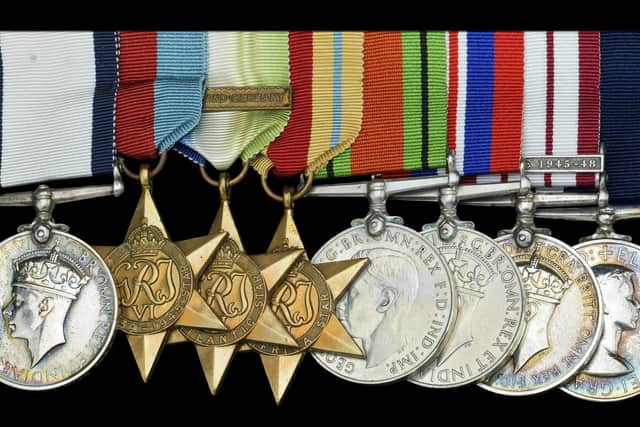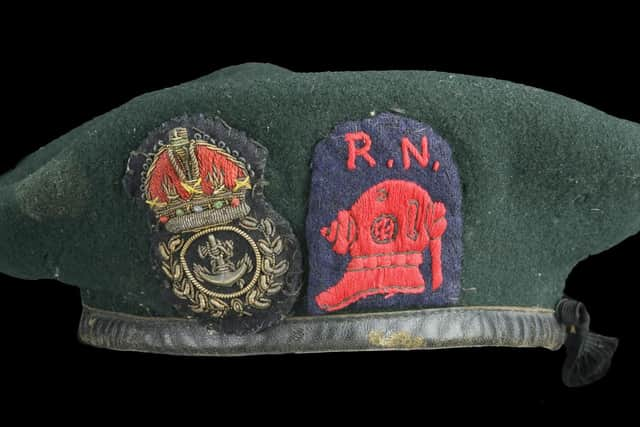Medals belonging to D-Day hero who destroyed two '˜huge' German guns to be auctionedÂ


Petty officer Ron McKinlay found himself on the wrong invasion beach at Normandy after his landing craft was blown up and he was forced to swim to shore.
He teamed up with a handful of other 'lost' men and set out for their original objective two-and-a-half miles away, only to encounter a number of enemy gun emplacements along the way.
Advertisement
Hide AdAdvertisement
Hide AdBeing the only commando in the group, Ron was nominated to destroy one of the 88mm gun emplacements which he did by sneaking up close enough to hurl three grenades at it.


He captured the only enemy survivor of the attack, a 'huge' German soldier.
But as he marched him back towards his group, a colleague mistook the situation and shot the prisoner, much to Ron's fury.
Later on D-Day, the seaman was involved in a bizarre and comical moment when he thought he saw an enemy soldier coming right towards him wielding a pistol.
Advertisement
Hide AdAdvertisement
Hide AdIt was only when 'both' men opened fire at the same time he realised he had shot at a reflection of himself in a large mirror that had put up in a dug-out he had just searched.


Still on June 6, Ron distinguished himself again by braving sniper fire to drag to safety a wounded comrade who was being shot at while lying face down in the dirt.
He was one of only two men to receive the prestigious Conspicuous Gallantry Medal for his brave actions on D-Day.
He went on to serve as a Royal Navy frogman under Commander Lionel 'Buster' Crabb, who infamously disappeared during a reconnaissance mission on a Soviet ship in Portsmouth Harbour in 1956.
Advertisement
Hide AdAdvertisement
Hide AdRon also worked on the 1955 war film 'Above Us the Waves' which starred John Mills.


His medals have now been put up for sale at auction by a private collector for an estimated £40,000.
A spokesman for London auctioneers Dix Noonan Webb said: '˜Ronald McKinlay was one of the great heroes of D-Day.
'˜He was one of just two men who won the Conspicuous Gallantry Medal during the history-changing landing on the Normandy beaches.
Advertisement
Hide AdAdvertisement
Hide Ad'˜The CGM was at that time the second highest gallantry award after the Victoria Cross that the non-commissioned ranks of the Royal Navy and the Royal Marines could be awarded.
'˜The story of McKinlay's D-Day is straight out of the movies. Finding himself on the wrong landing beach he destroyed two German strong points as he and a group of other 'lost' sailors and soldiers fought their way back to where they were supposed to be.
'˜The scene where he opened fire only to realise that he was shooting at an image of himself in a mirror would grace any film script.
'˜So perhaps it was appropriate that after the war he was one of the naval personnel who worked alongside the movie star John Mills in the film Above Us the Waves.'
Advertisement
Hide AdAdvertisement
Hide AdRon was the son of a publican from Portsmouth, Hants, and worked as a humble Post Office messenger before the outbreak of the Second World War.
He volunteered to join the Royal Navy in 1941 when he was aged 17 and in March 1943 he was sent on specialist training as a Royal Navy Commando.
On D-Day his task was to leap ashore on Juno Beach and erect signs to mark the beach exits for the Duplex Drive tanks rolling off landing crafts (LCTs).
But as his LCT neared the shore it was hit by an 88mm shell. The damaged craft drifted out of control and Ron jumped overboard to avoid the bullets and mortar bombs exploding around it.
Advertisement
Hide AdAdvertisement
Hide AdA cassette recording of him relating his wartime experiences is included in the sale. He states: '˜I was mad to think that after all my training...I was going to be denied my finest hour.
'˜We were under fire as we hit the beach and we all made for cover.
'˜The only other personnel on this beach were dead. I remember the bodies being washed in and out with the waves - they just rolled in and out.'
Ron landed on Gold Beach instead of Juno. The small party, led by a major, trekked towards their objective when they encountered the German 88mm guns.
Advertisement
Hide AdAdvertisement
Hide AdAfter storming the enemy position with grenades, he recalled: '˜I started weaving in and out of sand dunes, as I rounded one there was this large German pointing his rifle at me.
'˜At the time he looked 10 feet tall. He lowered his rifle and I lifted mine. I was not afraid, nor did I have any instinct to kill. I took his rifle, searched him and directed him back to our lines.
'˜Then something happened which filled me with shame.
'˜As he continued to walk around the dune, a single shot rang out and he fell clutching his hands to his stomach.
'˜As I got to him the blood was coming through his fingers. He looked up at me, and I will never forget that look.
Advertisement
Hide AdAdvertisement
Hide Ad'˜I found myself saying, '˜I'm bloody sorry, it wasn't me'Â Â But inside I was angry, there was this man surrendering with his hands in the air who had just been shot.'
His medals are being sold on September 26.
 Â